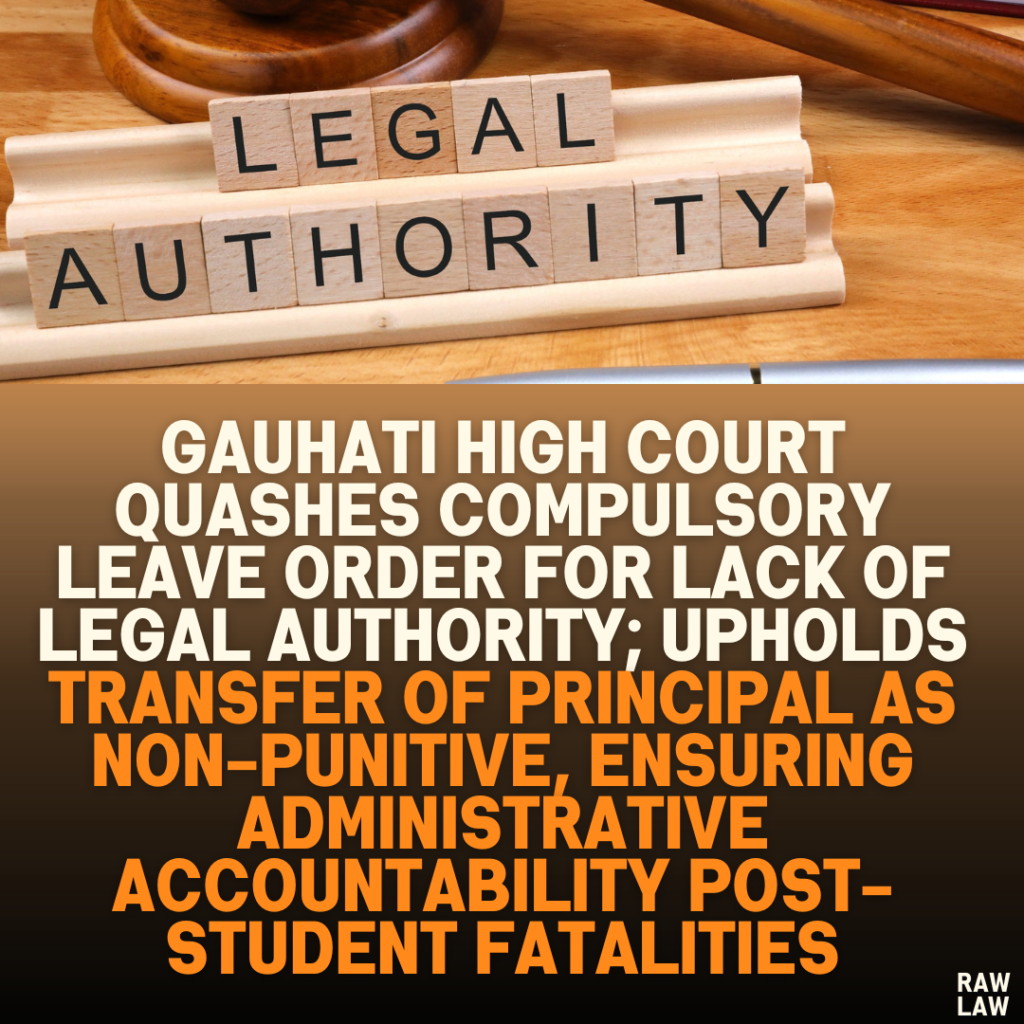Court’s Decision:
The Gauhati High Court quashed the notification compelling the petitioner to proceed on leave, citing a lack of legal foundation. However, it upheld the subsequent transfer order, finding it was issued in public interest and not punitive.
Facts:
- Accident and Public Response:
- On May 29, 2023, a fatal road accident claimed the lives of seven students from Assam Engineering College.
- The incident attracted public outcry, leading to scrutiny of the administrative measures in place at the college.
- Notifications and Disciplinary Actions:
- The petitioner, serving as the Principal, was directed via a notification dated June 1, 2023, to proceed on compulsory leave.
- Allegations included administrative lapses and failure to maintain discipline within the institution.
- A High-Level Committee was constituted to investigate the accident and its causes. The committee highlighted administrative failings, including the petitioner’s lack of implementation of prior resolutions aimed at improving campus discipline.
- On January 29, 2024, a notification transferred the petitioner to Jorhat Institute of Science and Technology (JIST).
- Petitioner’s Challenges:
- The petitioner questioned the legality of the compulsory leave order and argued that the transfer order was punitive, as it occurred during the pendency of disciplinary proceedings.
Issues:
- Was the compulsory leave notification valid under service jurisprudence?
- Was the transfer order punitive or a legitimate administrative action?
Petitioner’s Arguments:
- Compulsory Leave Notification:
- The June 1, 2023 notification directing compulsory leave was arbitrary and lacked any statutory basis.
- Compulsory leave is not recognized under service law unless voluntarily applied by the employee.
- Transfer Order:
- The transfer was punitive and not justified by any legitimate administrative exigency, as disciplinary proceedings against the petitioner were still pending.
Respondent’s Arguments:
- Compulsory Leave Notification:
- The leave was necessitated by the gravity of the situation following the accident and aimed at facilitating an impartial investigation.
- The notification was within the administrative prerogative.
- Transfer Order:
- The transfer was an administrative measure taken to address complaints against the acting Principal of JIST.
- The order retained the petitioner’s rank, pay, and seniority, negating any punitive intent.
Analysis of the Law:
- Compulsory Leave:
- The Court held that leave applications are voluntary under service law. Employees cannot be compelled to take leave without express legal provisions.
- The June 1, 2023 notification compelling the petitioner to proceed on leave was unlawful, as it lacked statutory authority.
- Transfers as Administrative Actions:
- The Court emphasized that transfers are inherent in service terms. They are not considered punitive unless:
- Mala fide intentions are demonstrated.
- Statutory provisions are violated.
- The transfer has detrimental effects on the employee’s service conditions.
- Transfer orders, made following due process and for administrative reasons, are beyond the scope of judicial review under Article 226 of the Constitution.
- The Court emphasized that transfers are inherent in service terms. They are not considered punitive unless:
Precedent Analysis:
The Court referred to Sri Pubi Lombi vs. State of Arunachal Pradesh (2024 Supreme SC 225), wherein the Supreme Court outlined key principles:
- Judicial interference in transfer orders is permissible only when:
- There are pleadings of mala fide intentions.
- The affected party is not named in the allegations.
- There is a violation of statutory provisions.
- The transfer adversely affects the employee’s service conditions.
In this case, none of these criteria were satisfied.
Court’s Reasoning:
- Compulsory Leave:
- The respondents failed to demonstrate any legal provision authorizing the compulsory leave.
- Leave, being voluntary, cannot be enforced unilaterally except in cases where law explicitly provides for it.
- Transfer Order:
- Records indicated that the transfer was motivated by administrative requirements, particularly addressing complaints against the acting Principal of JIST.
- The petitioner was transferred without any loss of rank, pay, or seniority, ensuring no punitive consequences.
- The transfer was found to be in public interest, as supported by administrative records.
Conclusion:
- The compulsory leave notification dated June 1, 2023, was quashed for lacking legal authority.
- The transfer notification dated January 29, 2024, was upheld as a legitimate administrative action, not punitive in nature.
- The writ petition was partially allowed.
Implications:
- Compulsory Leave: This judgment reinforces that government employees cannot be compelled to take leave unless explicitly authorized by law.
- Transfers: It affirms that courts will not interfere with transfer orders unless mala fide, procedural violations, or adverse consequences for the employee are evident.
- Administrative Authority: Institutions must ensure procedural compliance and transparency in disciplinary or administrative actions to avoid judicial invalidation.




Pingback: Jammu & Kashmir High Court Rules Repeal of Right of Prior Purchase Act Nullifies Pending Pre-emption Appeals: "Appeals Abate Without Retrospective Protection for Substantive Rights" - Raw Law